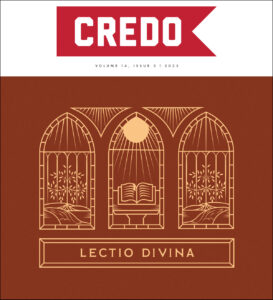Although the teaching about the devotional practice of Lectio Divina has predominantly resided in the domain of writers from the Roman Catholic tradition, in recent decades LD has captured the interest of a growing number of Protestants. In my reading as a professor of Biblical Spirituality, I have also observed a rapidly increasing interest in the practice among evangelicals, including some in my Southern Baptist family.
A 2023 book by Hans Boersma, Pierced by Love: Divine Reading with the Christian Tradition[1], has accelerated that interest to the degree that this article is appearing in an entire issue of a magazine devoted to the subject.
What Do You Mean by Lectio Divina?
As with term “mysticism”—another common term in the study of Christian spirituality—everything about Lectio Divina turns on the definition of the term and the description of its four elements: reading, meditation, prayer, and contemplation. Some advocates describe LD in a way that places very little emphasis on the Bible. Others do so in a way that sounds almost identical to what I have published in Praying the Bible.[2] Every Bible-believing Christian is for reading and meditating on the Bible, prayer, and deep experiences with God. This is the heart of the best forms of Lectio Divina and prevents practitioners from reading the Bible like historians. Even so, controversy almost inevitably arises over what is meant by the fourth step in LD, “contemplation.” It is especially here that many writers lean more into mystical experiences than on Scripture.
The essence of Boersma’s position on contemplation seems to be this: “Only after much patient exploration of the sacramenta [reading, meditating, and prayer] do we get a glimpse of the res [reality] of God’s love as he takes us beyond our words into contemplation of the eternal Word. It is typically only after much practice that, with Saint Paul, some are caught up into Paradise itself (2 Cor. 12:4)” (15).
In the rest of the book he manifests a high view of Scripture, and there’s not much I would quibble about on the essentials of his approach to reading, meditating, and prayer. As an evangelical, his book would have been more persuasive to me had he used more examples related to these three elements from writers nearer to my theological tradition, but I understand that his subject is Lectio Divina and he wanted to focus on resources aligned closely with that. But for those who are interested, a look at George Müller’s testimony of how meditation on Scripture transformed his prayer life would be instructive.
Clarifying Hidden Meaning
The major exception I have to Boersma’s teaching on reading and meditation is his apparent endorsement of the concept of engaging in them to find the “hidden meaning” of a text. “Finding this hidden meaning is the purpose of reading the divine Scriptures” (14). Commenting on Origen’s view of this, Boersma explains that this is nothing more than looking for “the New Testament realities of Christ and the church.” Maybe. The plain meaning of the text often seems to get short shrift in the Lectio Divina tradition. Granted, we are to read the Scriptures Christologically, but whenever Boersma refers to “the traditional four levels of biblical meaning (literal, allegorical, tropological, and analogical)” (53), he seems to associate LD far more with the latter three than the first. Perhaps more clarity about, or a few affirmations and denials about the meaning of “hidden meaning” would be helpful.
In my view, advocates of Lectio Divina should always be careful to address the importance of “rightly handling the word of truth” (2 Tim. 2:15). I realize that the devotional reading of Scripture is in its own category, still, isn’t it possible to experience God to the full from an accurate reading of the text? Perhaps the trained biblical scholars reading this need no warning about misusing the text in Lectio Divina, but I fear that the typical lay reader who goes looking for the “hidden meaning” of a text could end up with spiritual impressions that are inconsistent with Scripture. In my view, advocates of Lectio Divina should always be careful to address the importance of “rightly handling the word of truth” (2 Tim. 2:15) Share on X
Biblical Input Prior to Contemplation
My primary concern with Lectio Divina overall can be summarized this way: we can easily find commands and examples related to reading the Bible, meditating on Scripture, and praying the Bible, but can the same be said about contemplation? Some have argued the case, but I’ve yet to be persuaded.
The Bible expressly claims its sufficiency for spirituality when it says, “All Scripture is breathed out by God and profitable for teaching, for reproof, for correction, and for training in righteousness, that the man of God may be complete, equipped for every good work” (2 Tim. 3:16-17; emphasis added). To me, if some of the forms of contemplation suggested by proponents of LD become necessary to experience the highest forms of communion with God, then we have gone beyond that which is specifically mentioned or clearly implied in Scripture. Furthermore, it is worth noting that Luther was well-trained in Lectio Divina as an Augustinian monk for many years, but afterward either added tentatio to the process or replaced contemplatio with tentatio (scholars debate which). But regardless of one’s view of that, Luther’s voice is one worth hearing.[3]
If we rightly read, meditate on, and pray the words of Scripture, and do so unhurriedly and in the presence of God, with a humble expectancy of the Spirit’s ministry to us, can’t we expect all (private) edifying spiritual experiences through these explicitly prescribed means? Must we also seek afterward to venture into a subjective state not prescribed or bounded by Scripture to get “more”?
Someone might say, “But contemplation is merely the culmination of the saturation of Scripture that has preceded it. The biblical input prior to contemplation provides quality control for the experience.” Ideally, that may be the intention, but once a person turns their attention from the Bible they enter into uncharted territory where their own subconscious too easily takes over.
Better Meditation and Prayer
It may be that many think contemplation is necessary because they are not sufficiently meditating on and/or praying the Bible. Heretofore their devotional experience has largely been that after reading the Bible they often realize that they cannot remember anything they’ve read. Then they pray, basically saying phrases of their own fabrication which they have uttered countless times before and which they frequently (and understandably) find dry and boring. Then someone teaches them some form of Lectio Divina and it’s transformative.
I would contend that in many cases it’s only because they’ve not been meditating after they’ve read nor are they praying the Bible. If they would simply meditate and pray as they should I believe they would experience God through the text far more deeply and often, and find the teaching of Lectio Divina essentially redundant. What they are taught to seek via contemplation they would experience during meditation and prayer.
Experience Wanted
Let me be clear: I want to experience God through the devotional life as much as possible. I decry a rationalistic approach to personal piety. I am—as I believe all true Christians are—a supernaturalist. I believe in the Holy Spirit and experiences with Him. I have written an entire chapter about times of biblically-based, God-centered worshipful silence before the Lord (Hab. 2:20; Zeph. 1:7; Zech. 2:13).[4] I affirm the reality of ineffable experiences in both public and private worship where one is overcome with the presence of God, love from and to Jesus, joy in the Holy Spirit, a longing for Christ, holiness, and Heaven, and more. But I fear seeking experiences with God that are not inaugurated by or guided by Scripture.
Proposing a Three-Part Lectio Divina
So when I am asked if I recommend Lectio Divina, I reply that I celebrate anything that helps people read the Bible, think about what it says, and pray about it. But I find that by the time I finish describing what I do mean and don’t mean by Lectio Divina, and after I give what I believe are the necessary warnings of what to avoid if they read further on the subject, that the term is no longer helpful. Defining and delimiting terms and offering detailed warnings is appropriate in an academic setting, but in the local church I prefer not to use the term and simply teach people how to read, meditate on, and pray the Bible. I can show them those things in the Book in their hands. In the local church I prefer not to use the term and simply teach people how to read, meditate on, and pray the Bible. I can show them those things in the Book in their hands. Share on X
But if, for whatever reason, one must use the term, I would propose a three-part Lectio Divina instead of four. As LD rightly recommends, we should begin any planned time of fellowship with the Lord with His Word to us; reading, followed by meditation on something from the passage. My general rule for the daily intake of Scripture is “read big; meditate small.” Read a “big” section of Scripture, such as one or more chapters. This gives us context and helps us learn the overall narrative of Scripture. Then from that reading select something “small”—such as a word, phrase, or verse—to meditate upon. (I also find that most are helped by some instruction on how to meditate on the text.) Then it naturally follows for meditation to flow into prayer, especially about what one has just meditated on, though it would be common to expand one’s prayer to other parts of the reading or even to one of the Psalms. Thus we hear from God through His Word, think deeply about what He has said, and speak to Him about it in prayer. This is safe and sufficient ground for truly meeting with and experiencing God.
So let us—with all our hearts and minds—read, meditate on, and pray the Bible, and allow the spiritual experiences and divine encounters to come through these—and they will.
Endnotes
[1] Hans Boursma, Pierced by Love: Divine Reading with the Christian Tradition (Bellingham, WA: Lexham Press, 2023).
[2] Donald S. Whitney, Praying the Bible (Wheaton, IL: Crossway, 2016).
[3] See the preface by Timothy J. Wengert (xiii-xv) in Philip D.W. Krey and Peter D.S. Krey, ed. and trans., Luther’s Spirituality (New York: Paulist Press, 2007). See also Luther, Works, 57:285-87.
[4] Donald S. Whitney, Spiritual Disciplines for the Christian Life (Colorado Springs, NavPress: 2014), 221-248.


